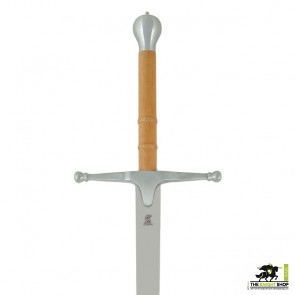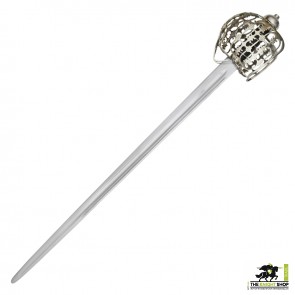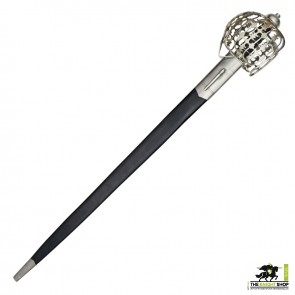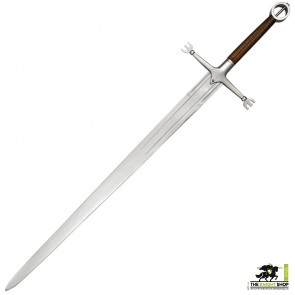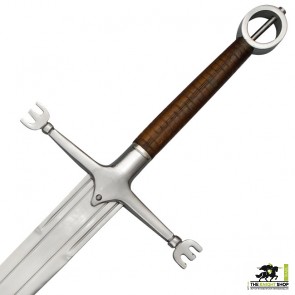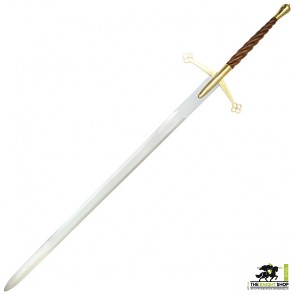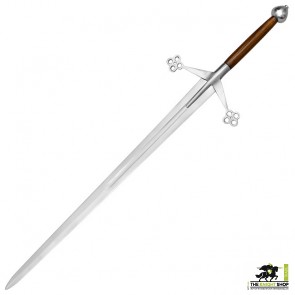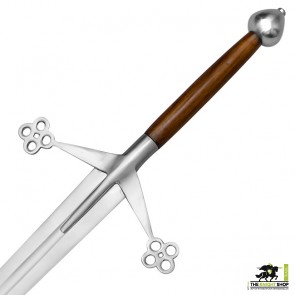Scottish Swords
-
Squire's William Wallace Braveheart Sword
Sir William Wallace was a Scottish knight and one of the main leaders in the Wars of Scottish Independence. In September 1297 he defeated the English army at the Battle of Stirling Bridge. After the battle he was appointed Guardian of Scotland and served until he was defeated at the Battle of Falkirk in 1298. He continued to fight for Scottish independence until he was captured in 1305 executed in London for crimes of High Treason. In death his exploits passed into legend. Sir Walter Scott wrote about him in “Exploits and Death of William Wallace – the “Hero of Scotland”.
Learn More
Our Squire’s William Wallace Braveheart Sword is inspired by the sword used in the film Braveheart. It is manufactured in the world famous Art Gladius factory in Toledo, Spain. The stainless steel blade is topped by a steel guard and pommel and features a stained wood grip. This sword features a blunt blade and is designed for display only.
Total length: 107.5 cm
Blade length: 82.5 cm
Grip length: 17.5 cm
Weight: 1272 g
Blade thickness (base): 0.3 cm
Blade width (base): 3.7 cm
Point of Balance (PoB): 9 cm
Blade: Stainless Steel
Edge: Blunt
Pommel: Threaded
Scabbard: None
All dimensions are approximate and may vary from piece to piece. -
Brass Claymore
Overall Length: 133.5cm
Learn More
Blade Length: 104cm
Blade Width: 5cm
Blade Thickness: 0.5cm
Guard Width: 26.5cm
Weight: 2396g
Material: Steel Blade, Wooden Grip, Brass Guard & Pommel
Edge: Blunt
Pommel: Nut
Scabbard: None
All dimensions are approximate and may vary from piece to piece. -
Sinclair Sabre - Scottish Cutlass
The Sinclair Sabre is a type of cutlass also known as a Dusägge (or Dusack). It was named after George Sinclair, a mercenary captain from Scotland whose men frequently carried these swords.
Learn More
In 1612 he was transported by the pirate captain Robert Stewart to fight the Danes but ambushed and killed when leading his men against Norwegian militia.
Total length: 80cm
Blade length: 64cm
Grip length: 10cm
Weight: 1594g
Blade thickness (base): 10mm
Blade width (base): 4.5cm
Point of Balance (PoB): 7cm
Blade: High Carbon Steel
Edge: Blunt
Pommel: Nut
Scabbard: Leather, Wood, Steel
All dimensions are approximate and may vary from piece to piece. -
Scottish Highland Officer's Broadsword
Step back in time and wield a piece of history with our meticulously crafted replica of the Eglinton “Pinch of Snuff” Scottish Highland Officer’s Broadsword. This elegant broadsword, inspired by an original from the early 19th century, epitomizes the distinctive style and valor of the Scottish Highland officers who carried it.
Learn More
Deepeeka’s replica features an authentic basket hilt design, complete with intricate steelwork and a rich blackened leather grip that mirrors the original’s craftsmanship. The blade is forged from high-quality, tempered carbon steel, ensuring both durability and an impressive historical appearance. The sword’s guard is adorned with intricate scrollwork and pierced designs, enhancing its authenticity and making it a striking display piece or a functional addition to reenactments and costume events.
Total Length: 99cm
Blade Length: 82cm
Blade Width: 4cm
Guard Width: 14cm
Grip Length: 11cm
P.O.B (from guard): 11cm
Edge: Blunt
Weight: 1310g
All dimensions are approximate and may vary from piece to piece. -
William Wallace Braveheart Sword - Brass
Our William Wallace Braveheart Sword is inspired by the sword used in the film Braveheart.
Learn More
It is forged from high carbon steel and features a broad blade topped with solid brass hilt fittings and a brown suede ricasso and grip. This sword features a blunt blade and is designed for display only.
Total length: 136cm
Blade length: 97.5cm
Grip length: 28.6cm
Weight: 2.1kg
Blade width (base): 4.3cm
Point of Balance (PoB): 14cm
Blade: High Carbon Steel
Edge: Blunt
Pommel: Threaded
Scabbard: None
All dimensions are approximate and may vary from piece to piece. -
William Wallace Braveheart Sword
Sir William Wallace was a Scottish knight and one of the main leaders in the Wars of Scottish Independence. In September 1297 he defeated the English army at the Battle of Stirling Bridge. After the battle he was appointed Guardian of Scotland and served until he was defeated at the Battle of Falkirk in 1298. He continued to fight for Scottish independence until he was captured in 1305 executed in London for crimes of High Treason. In death his exploits passed into legend. Sir Walter Scott wrote about him in “Exploits and Death of William Wallace – the “Hero of Scotland”.
Learn More
Our William Wallace Sword is a well-made replica of the sword used in the film. It is crafted in the world famous Art Gladius factory in Toledo, Spain and features a broad stainless steel blade topped with solid steel hilt fittings and a dark brown leather ricasso and grip. This sword features a blunt blade and is designed for display only.
Total length: 139cm
Blade length: 103cm
Grip length: 25.5cm
Weight: 2914g
Blade thickness (base): 0.53cm
Blade width (base): 4.5cm
Blade: Stainless Steel
Edge: Blunt
Pommel: Threaded
Scabbard: None
All dimensions are approximate and may vary from piece to piece. -
Braveheart William Wallace Sword - Marto
Sir William Wallace is best known from the 1995 blockbuster “Braveheart” starring Mel Gibson. Our William Wallace Sword is inspired by the sword used in the film.
Learn More
It is crafted in the world famous Marto factory in Toledo, Spain and features a fully tempered AISI 440 stainless steel blade topped with solid steel hilt fittings and a brown suede leather ricasso and grip. This sword features a blunt blade and is designed for display only.
Length: 133cm
Blade: AISI 440 Stainless Steel
Edge: Blunt
Pommel: Threaded
Scabbard: None
All dimensions are approximate and may vary from piece to piece. -
Gallowglass Sword
The word Gallowglass is an Anglicisation of the Irish word Gallóglaigh meaning “foreign soldiers”. They were mercenary warrior elite among Scottish clans living in the Highlands and Western Isles between the 13th and 16th century. During the 13th century they started to settle in Ireland where military chieftains would frequently use them as bodyguards as they were not subject to local feuds or influences.
Learn More
A description from 1600, speaks of the Gallowglass as "...pycked and scelected men of great and mightie bodies, crewell without compassion. The greatest force of the battell consisteth in them, chosing rather to dye than to yeelde, so that when yt cometh to handy blowes they are quickly slayne or win the fielde." They were famed for using their broadswords or claymores ("claíomh mór" - Gailic for “Great Sword”) with terrifying effect in battle.
Overall Length: 136cm
Blade Length: 104cm
Blade Width: 6.35cm
Blade Thickness: 0.6cm
Guard Width: 30cm
Guard Depth: 2.9cm
Grip Length: 18.5cm
Blade: High Carbon Steel
Edge: Blunt
Pommel: Peened
Scabbard: None
All dimensions are approximate and may vary from piece to piece. -
Twisted Hilt Scottish Claymore
The Claymore (from the Scottish Gaelic claidheamh-mòr, meaning “great sword”) is a Scottish variant of the late medieval 2 handed sword. It differed from other longswords of the period in that it usually had forward sloping quillons terminating in quatrefoils. Claymores were in use during constant clan warfare and fights with the English from the 15th to 17th century. Claymores did exist as early as the Wars of Scottish Independence although they were smaller and few had the characteristic quatrefoil design. The last time that claymores were seen on the battlefield in any significant number was the Battle of Killiecrankie in 1689.
Learn More
Our Twisted Hilt Scottish Claymore features a hand-forged high carbon steel blade topped with brass hilt fittings and a hand carved real wood grip. This sword has a blunt blade and is designed for display only.
Overall Length: 143cm
Blade Length: 106.5cm
Grip Length: 23cm
Weight: 2294g
Blade thickness (base): 0.5 cm
Blade width (base): 5 cm
Point of Balance (PoB): 19.5 cm
Blade: High Carbon Steel
Edge: Blunt
Pommel: Peened
Scabbard: None
All dimensions are approximate and may vary from piece to piece. -
Two Handed Scottish Claymore
The Claymore (from the Scottish Gaelic claidheamh-mòr, meaning “great sword”) is a Scottish variant of the late medieval 2 handed sword. It differed from other longswords of the period in that it usually had forward sloping quillons terminating in quatrefoils. Claymores were in use during constant clan warfare and fights with the English from the 15th to 17th century. Claymores did exist as early as the Wars of Scottish Independence although they were smaller and few had the characteristic quatrefoil design. The last time that claymores were seen on the battlefield in any significant number was the Battle of Killiecrankie in 1689.
Learn More
Our Two Handed Scottish Claymore has a hand-forged high carbon steel blade topped with solid steel hilt fittings and a stained real wood grip. This sword has a blunt blade and is designed for display only.
Overall Length:123cm
Blade Length: 92cm
Blade Width: 5.8cm
Blade Thickness: 0.5cm
Guard Width: 29cm
Guard Depth: 2.9cm
Grip Length: 19cm
Blade: High Carbon Steel
Edge: Blunt
Pommel: Peened
Scabbard: None
All dimensions are approximate and may vary from piece to piece.





